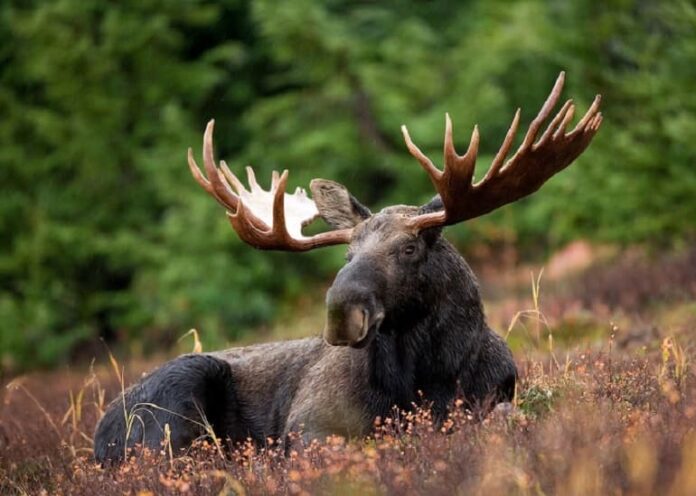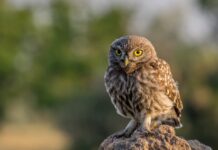The deer family consists of 43 species, and they are native to all continents except Antarctica and Australia. You will find the 10 largest deers in the world that can grow way taller than an average human. A few species might already come up in your mind, so let’s see those large deer species together.
10Mule Deer
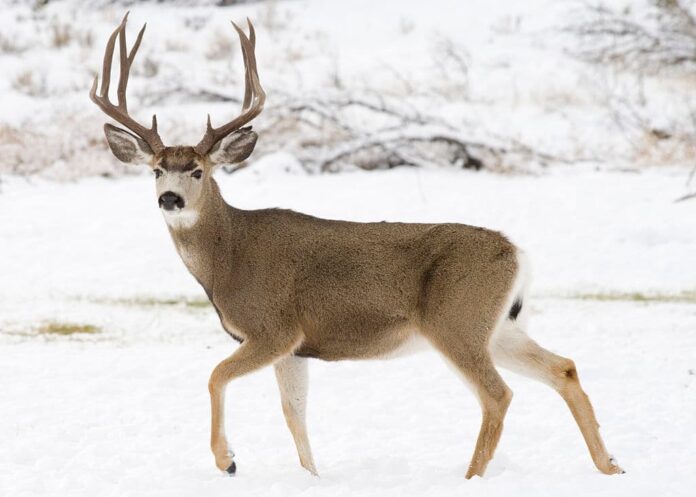
Height: 0.9 – 1 meter (2.9 – 3.2 feet)
Mule deers are one of the majestic icons of the American West, admired by hunters and outdoorsmen. Received its name from the large ears that are like those of the mules, this is one interesting deer species. The cool part is that they can move their ears independently to survey for potential danger around them. These large deers have powerful and stocky bodies with keen senses and awareness of their surroundings. The best part is their 310 degrees view angle eyes that help them to see around with ease.
All of the special senses play a huge part in their survival because mule deers are not the best at fighting. They always stay alert, and they are very sensitive to moving objects around them. Along with that, mule deers are fast runners with a special ability to change directions in a single bound. Plus with their unique leaping gait, these deers are also capable of living and walking in arid environments and deserts. As long as there is enough vegetation to hide in and to eat, mule deers are not picky about where to live at all.
9Marsh Deer
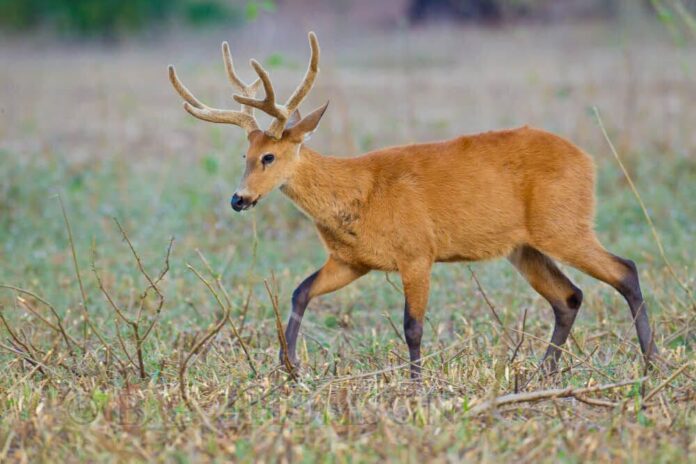
Height: 1.0 – 1.2 centimeters (3.2 – 3.9 feet)
You can notice their large ears right away, and this is one of the features that makes them different from other deers. These are the largest deers in South America with large hooves and elastic interdigital membranes. Thanks to their special body features, marsh deer are able to swim and walk on marshy surfaces without a problem. Just like their name suggests, this deer species live only in marsh areas with high vegetation. Where they live does not only provide them with plenty of food but also protection from predators at the same time. Their major threats are hunting and habitat destruction due to agriculture, dams, and tree plantations.
8Elaphure
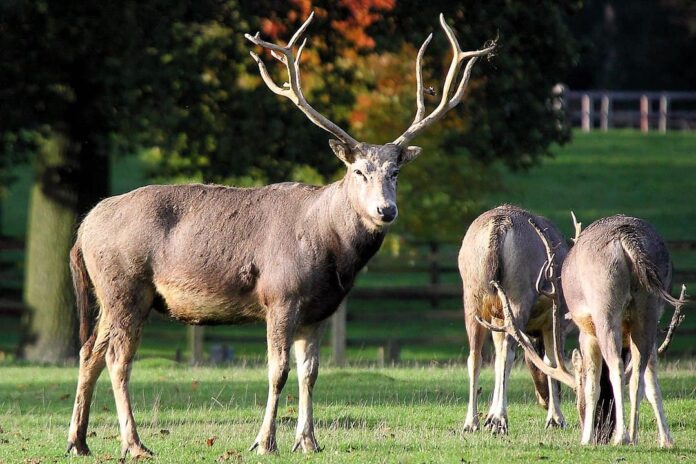
Height: 1.2 meters (3.9 feet)
Elaphure aka Pere David’s deer or Milu is a large deer species native to the river valleys of China. They live in marshlands and swamps where they feed on grass and other plants. The special thing about this species is that there is a webbing between its toes, making it an excellent swimmer. The Chinese call them Sibuxiang, meaning “four not alike” because of their strange appearance. Elaphures have the antlers of a deer, the hooves of a cow, the neck of a camel, and the tail of a donkey. This is why Sibuxiang is a perfect description of their unique features.
7Barasingha
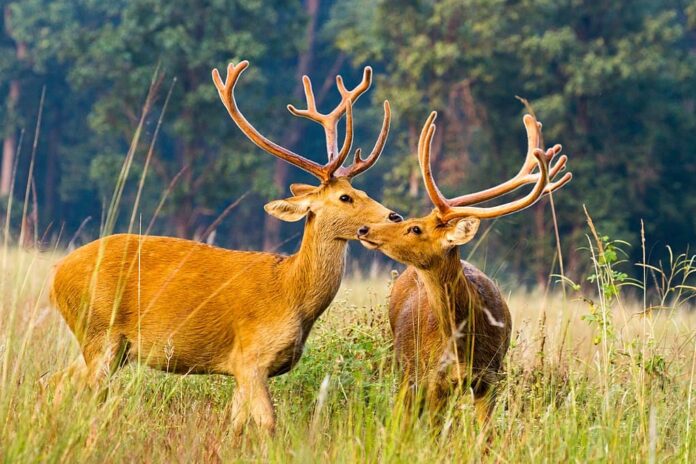
Height: 1.1 – 1.2 meters (3.6 – 3.9 feet)
This is a large deer species that is distributed in the Indian subcontinent with a unique antler feature. Barasingha aka swamp deer has large antlers with more than 3 tines, hence the name barasingha meaning “twelve-horned” in Hindustani. Only the males have antlers, and a mature stag can have between 14 to 20 tines. Their main habitats are dry deciduous forests, mangroves, reed beds of large river floodplains, and tall grasslands.
These deers are social animals, and they live in a herd of 10 to 20 individuals usually of the same age. Not different from other deer species, a single female lead the herd of swamp deers. They move together, and they feed on aquatic vegetation, grass, and leaves. There are only around 3,500 to 5,100 of them now in the wild, according to the IUCN Red List. Their population is now threatened due to deforestation, diseases, habitat destruction, and illegal hunting for their antlers.
6Red Deer
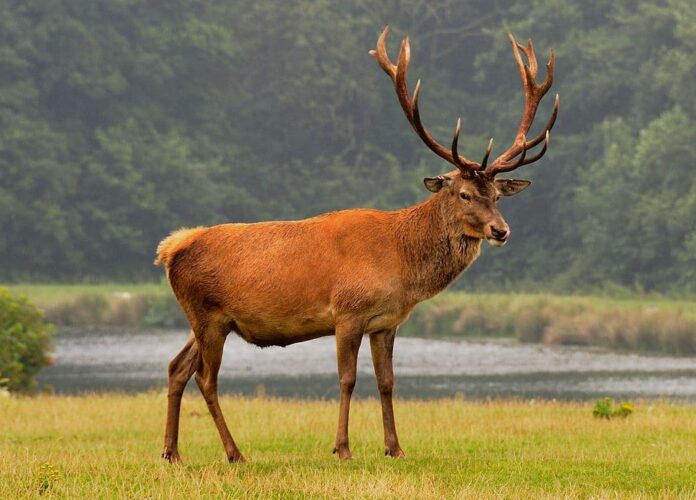
Height: 0.95 – 1.3 meters (2.9 – 4.2 feet)
Red deer is very easy to spot with dark reddy-brown color in summer or grayish-brown in winter. As one of the largest deers, this deer species is a close relative to wapiti which is also very large. You can find red deer in Asia Minor, Atlas Mountain, Europe, Iran, the Caucasus Mountains region, and western Asia. These deers prefer to live in aspen hardwood forests, clear cuts, coniferous hardwood forests, coniferous swamps, and open woodlands. There, they feed on forbs, grasses, red maple, sedges, and staghorn, but their favorites are aster, clover, dandelions, hawkweed, and mushrooms. Usually, red deers live in a herd of up to 400 individuals dominated by a single female.
5Thorold’s Deer

Height: 1.1 – 1.4 meters (3.6 – 4.5 feet)
Thorold’s deers are more common with the name white-lipped deers because of the white patches around their muzzles. Along with that, they also have distinct white-eye rings as well as white patches on their chins and throats. This species is one of the largest deers in the world, and they are native to the Tibetan Plateau. Living on high mountain slopes and rough terrain, their large and broad hooves play an important role in helping them climb.
White-lipped deers prefer to live in a mixture of forest and open clearings where they feed on leaves, grass, and other plants. As social animals, they live in a small herd of around 30 individuals while older males are solitary. Their population is decreasing due to overhunting for their body parts to use in oriental medicines, especially Chinese medicines. Habitat loss is one of the causes of the declining in their number, and this species is now considered Vulnerable.
4Reindeer
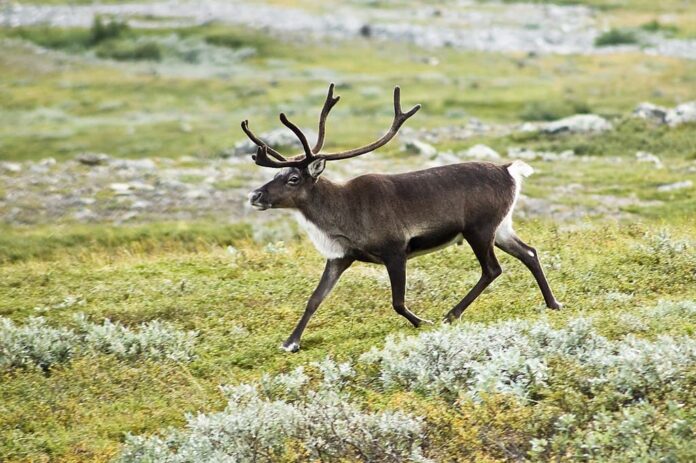
Height: 0.8 – 1.5 meters
Reindeer aka Caribou (in North America) is the only deer species that both males and females grow antlers. Another fascinating thing about them is that they click as they walk due to the tendon in their foot passing over a bone. Along with that, reindeer have an amazing sense of smell that helps them to identify food and predators. This is to compensate for the fact that their sense of hearing and sight are not so good.
These deers rarely stay in one place since they like to move around a lot, in massive herds between 50,000 and 500,000 members. No matter how much they move, their habitats always involve places with vegetation like fungi, lichen, and leaves to feed on. Reindeers are the only deer species that are widely domesticated as beasts of burden and farmed for hides, milk, and meat. They live in mountains, tundra, and woodlands, and they have thick coats that help them to stay warm in cold temperatures in winter.
3Sambar
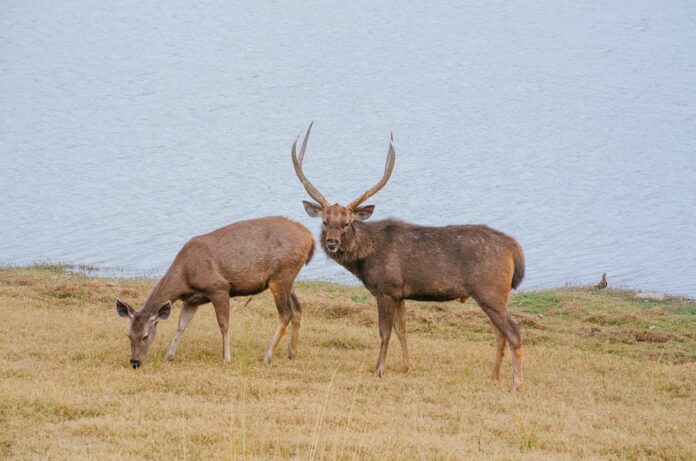
Height: 1.02 – 1.6 centimeters (3.4 – 5.4 feet)
Native to the Indian Subcontinent, South China, and Southeast Asia, sambar is one of the largest deers in the world. At the same time, this species is also Australia’s largest wild deer as well. Sambar deers are shy and wary but they are very strong and tough thanks to their coarse hair and thick hide. The unique thing about this deer species is that its tail is quite long for a deer. Along with that, sambar deers have long and strong legs that allow them to swim easily.
Another interesting thing about sambar deers is that they often live in high elevations, especially in the Himalayan Mountains. Sometimes you can also find them in woodland areas around Asia because they need to stay within distance of water sources. Not different from other large deer species, this one also eats a lot of food each day. Their diet consists of fruits, grass, leaves, and other plants. These large deers are solitary, but they form small herds of no more than 6 members sometimes. Sambar deers have an excellent sense of hearing and smell that they use to detect predators such as leopards, tigers, etc.
2Elk
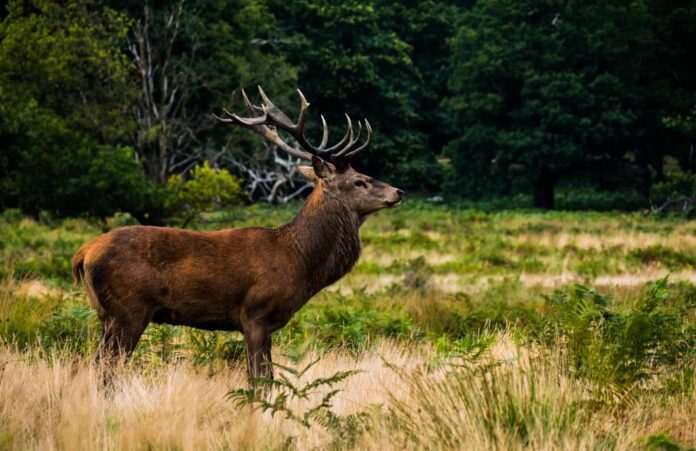
Height: 1.2 – 1.5 meters (4 – 5 feet)
Not to be confused with moose of North America, elk is another name for Wapiti which is one of the largest deers. Elks are broader than deer but not as massive as moose so it is not difficult to tell one. Despite their large size, elks are also fast runners and they can outrun horses in short races. On top of that, elks can also jump up to 8 feet over fences, vertically, looking super cool. You can find them all over the world in coniferous swamps and open mountains, especially in the woodlands of North America.
Just like most other huge deers, elks also have massive antlers that you can recognize right away. The special thing about their antlers is that they grow very fast on top of their attractive appearance and size. In fact, an elk’s antlers can grow as much as one inch in just one day depending on sunlight. The bulls (male elks) often rub their antlers against tree barks to polish them to impress a cow (female elk). Elks are social animals, and they live in herds with up to 200 or more members run by a single female.
1Moose
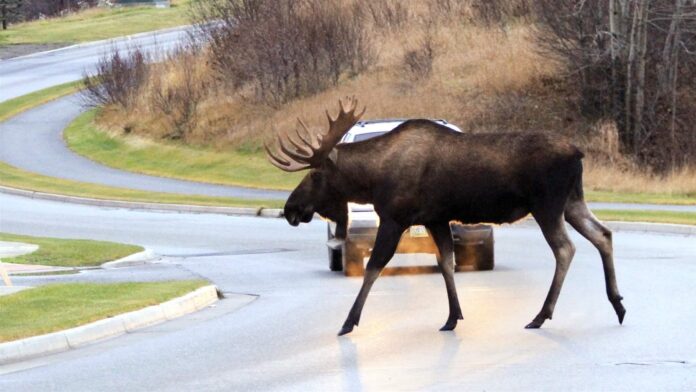
Height: 1.4 – 2.1 meters (4.6 – 6.9 feet)
As the largest deers in the family, a moose is unmistakably huge and tall. A male moose has enormous antlers that can spread up to 200 centimeters (79 inches) from end to end. Their distinctive features are the long faces and muzzles that dangle over their chins, and a flap of skin beneath their throat. Moose are docile towards humans, and they may become more aggressive in mating season. Because moose are so tall, their main diet consists of higher grasses and shrubs that they can easily eat. Food is abundant in summer, and you can find them near water sources like lakes or rivers feeding on aquatic plants.
When winter comes, they feed on pinecones and shrubs as well as lichens and mosses by using their large hooves. Those hooves are also very helpful because they support the weight of the moose in soft snow and marshy or muddy ground. At the same time, these large deers are also great runners and swimmers with a noticeable speed. Unlike elks, moose are solitary animals, and they will only come together in herds during mating season from September to October. You can find them in boreal forests and coniferous forests of Asia, and Europe, especially the northern parts of North America.
Related Post: Largest Wild Bovines

